PLEASE NOTE: THIS POST IS NEARLY 4 YEARS OLD AND MY BELIEFS ON OIL HAVE CHANGED AS MY WELLNESS JOURNEY HAS PROGRESSED. I CONSUME AND COOK WITH OILS REGULARLY NOW. I WILL NOT RESPOND TO COMMENTS.
What’s the deal with oil? There’s quite a lot of misleading and controversial information out there regarding our consumption of oils. Are they healthy or not? What about the so called “miracle” powers of coconut oil? Today I will break it down to help us understand the good and the bad about oils. I will also show how you to incorporate a healthy amount of fat into your everyday life while minimizing or eliminating your use of oils.
Reason 1: Oil is 100% pure fat
Products like olive oil, grapeseed oil, avocado oil and sesame oil are all extracted from plant foods to create pure oil. With 120 calories and 14 grams of fat per tablespoon, oil is the most calorically dense food there is. This means that oil in itself doesn’t offer any nutritional value. But the marketing schemes like to make us think otherwise. It’s basically eating concentrated calories! It’s really easy to use more oil than we need to. Especially in salad dressings or when saut?ing vegetables on the stove. Many raw vegan desserts use coconut oil which add to the already high fat content from the nuts and seeds. These raw gourmet treats can be deceiving! I’m guilty of loving these desserts and creating recipes with oils here on my blog, but I’ve been making a conscious effort to reduce my oil intake. I’m not saying to cut them out completely because its unrealistic to say you will never eat dessert or something with oil again (unless you want to eliminate it completely which would be ideal!) Minimizing your intake of pure oil is essential to thrive in any healthy diet and it will only help your waistline too 🙂
Reason 2: Oil is Nutrient-Lacking and Processed
When you think about it, since oil is extracted from plants, it has become a processed food. The good nutrients like vitamins, phytochemicals and fiber that the plant originally offered are stripped away. So the healthy elements are missing and unfortunately, it’s no longer a whole food. There are better options to look out for when it comes to oils. Since many brands use different procedures, you have to become a label detective. If you are going to buy oil, make sure to purchase raw and cold-pressed oils as they aren’t heated to high temperatures during the extraction process. This means they are able to preserve more of the nutrients, making it a higher quality option.
Reason 3: It’s best not to single out specific nutrients like oil
When looking at the nutrients in whole foods, we know their effect is greatest when they are working together in conjunction with the other nutrients. That is the idea behind the “whole foods” diet. Eat the whole food and you get the whole package. But traditionally, we’ve been taught to take supplements that single out specific nutrients such as fish oil supplements for omega-3 fatty acids. According to plant based expert Dr. Esselstyn, ?Fish oil is not essential. Fish get their omega 3’s from plants. It is difficult to be deficient in omega 3 if you are eating 1-2 tablespoons of ground flax seed and green leafy vegetables at several meals. There is also research suggesting those who eat plant based become highly efficient in their own manufacture of omega 3. Patients on fish oil are at increased risk for bleeding.? Dr. Esselstyn recommends a low-fat plant based diet with about 10% of your total calorie intake coming from fat. He also recommends using NO OIL in your diet because of the saturated fat which injures the endothelial lining in your arteries.
Replacing supplements with specific nutrients from actual food is a much healthier option. So instead of adding flax oil to a smoothie, just add 2 tablespoons of ground flaxseeds and call it a day. The same goes for a supplement like vitamin C. Instead of taking a pill, eat some strawberries as they are packed with vitamin C and other beneficial nutrients.
What about Coconut Oil?
There are conflicting arguments regarding coconut oil and whether it’s truly beneficial over other oils or whether it’s just like them. I always have coconut oil on hand. It’s the only oil I’ve been using nowadays for cooking and baking. It’s all the rage in the health world right now and it’s easy to get sucked in to the hype. Some view it as a “miracle food” and others view it as damaging. It claims to aid in weight loss and speed up your metabolism. It’s perfect for beauty-related remedies but is it as healthy as its cracked up to be? I’m not as convinced as I was at first. While the raw, organic, cold-pressed, unrefined coconut oil is the better option, as opposed to the refined brands, I still think we should treat it like any other oil and minimize our intake.
Coconut oil is one of the rare plant sources of saturated fat, but there are different types of saturated fat. According to this article from Julieanna Hever, “About 87% of the fat in coconut oil is saturated. Depending on the carbon chain, the fatty acids have different effects on our health and cholesterol levels. The predominant fatty acid, lauric acid, does raise total cholesterol, but it appears to raise HDL cholesterol to an even greater extent than LDL cholesterol, favorably altering the ratio of HDL to total cholesterol. In addition, lauric acid is converted in the body into monolaurin, a powerful antiviral, antifungal, and antiseptic compound?and coconut oil is among the richest food sources of lauric acid.”
Overall, it seems to offer more benefits than most oils but I’m still going to treat it like what it is – oil! If you are trying to lose weight, you should avoid oil altogether or have about 1 tablespoon per day at max. But if you are healthy and not wanting to lose weight, you should be fine with minimizing and monitoring your intake.
How Should I Incorporate Healthy Fats?
Healthy fats like monounsaturated fatty acids and omega-3’s are essential for health, just like carbohydrates and protein. We need them for healthy cognitive function but the source of fat is most important.
Make sure to get your healthy fats from a variety whole plant foods like:
- Leafy greens: kale, spinach, collard greens
- Seeds: hemp seeds, chia seeds, flax seeds (1-2 tablespoons per day)
- Nuts: walnuts, sunflower seeds (a handful or about 1/4 cup is all you need)
- Soy Products: tofu, tempeh, edamame
- Algae Products like E3Live
- Avocado
- Olives
I know oil seems essential for cooking and baking but there are alternatives. Instead of saut?ing your vegetables in oil, try vegetable broth or a little water. Or better yet, steam your vegetables. Or keep your vegetables raw for exceptional health. For baking, I love to replace oil with organic all-natural applesauce or mashed bananas. As far as eating out goes, that’s always a challenge but food without oils like steamed vegetables and/or plain rice should never be a problem when eating at a restaurant. I think I will keep cutting back on my use of oils, maybe eliminating it is easier than we think!
What do you think about oils? How about coconut oil? Do you eliminate them completely or use small amounts?


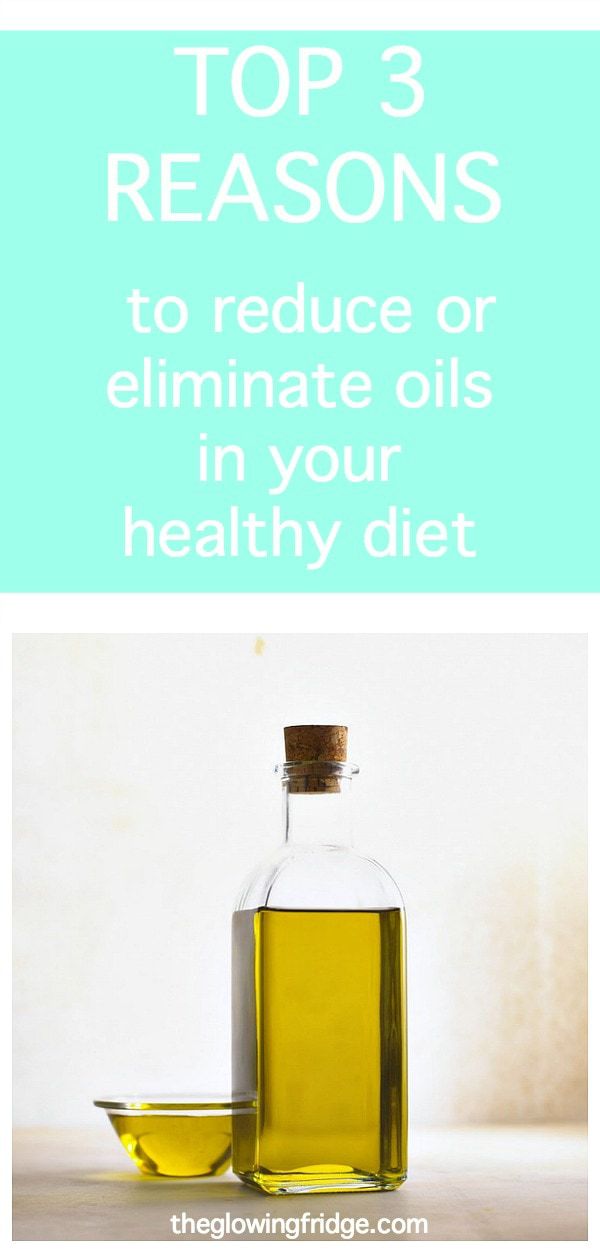
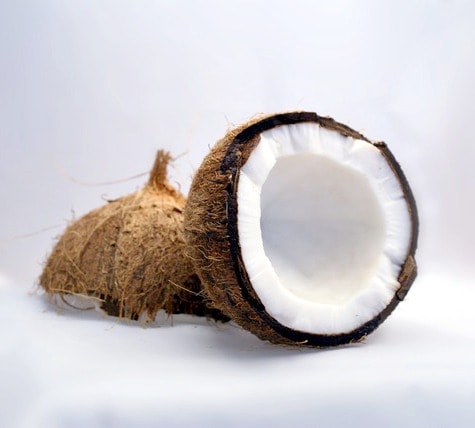
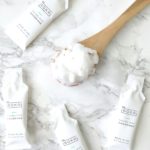



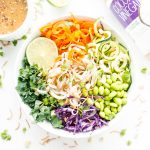
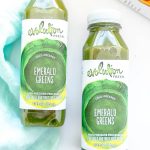


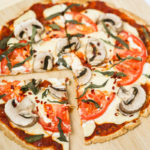
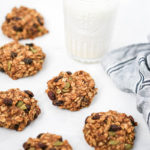
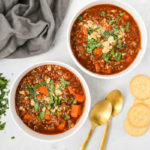
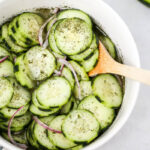
I consumed one tablespoon of olive oil with some healthy lysergic diethylamide drops and almost immediately went into seizures and bizarre hallucinations. I began speaking Greek fluently, though I’ve never even studied Greek, and kept begging (according to witnesses) for “a ship and a star to steer her by.” I can NOT condone the use of olive oil; it is dangerous and should be placed on a list of controlled substances. I still suffer from flashback hallucinations and an occasional urge to buy a boat I can not afford. STAY AWAY FROM OLIVE OIL!
I don’t really think you know what you’re talking about and shouldn’t be offering advice like this since you’re not a trained professional.
Oil is not the enemy. While it is calorie dense, olive oil is a big part of the Mediterranean diet which is one of the only (non plant based) diets with strong evidence of preventing chronic disease.
Fat (lipid) is also not an enemy. It’s an essential macronutrient in our diets. Fats have important roles in the body and provide energy. Unsaturated fats (olive and canola oil) can decrease LDL and increase HDL, reducing risk of heart disease.
Omega 3 not from animal products is found in some nuts and seeds, and OIL! Omega 6 is also found in oil.
Coconut oil is a saturated fat which can increase LDL cholesterol, and probably shouldn’t be taken in the amounts which people consume it nowadays, but untrained bloggers and journalists have touted its benefits so people think it’s good for you. It’s also not great for everyone’s skin, especially on the face. It can cause people to break out (myself included).
Of course you should watch how much oil you use when you cook, especially for weight loss, but it shouldn’t be completely eliminated from the diet.
Just have some self control and use a measuring spoon.
Also, if you’re worried about “processed food” almost everything you eat is processed in some way. Unless you pick it yourself from the tree, there’s some processing involved. People have been processing foods for thousands of years from sun-drying to curing and more.
Please read the note at the top of the post!
Actually, it is. there’s NO evidence that olive oil is healthy, none, and I defy you to find the proof. admittedly , cold pressed (real actual cold pressed) olive oil is BETTER, but its used SPARINGLY in mediterranean cooking and they’d be BETTER OFF without it. Dr Chris Knobbe goes into extensive detail how the healthiest populations on the planet AVOID ALL OF IT. Coconuts are fine, whole olives are fine, refined olive oils, NO. its not the same stuff. You can eat VERY low carb high fat diets like the Maasai, or very HIGH carb, low fat, low protein diets and be very healthy like many pacific islanders. their common factor was NO seed oils. https://www.youtube.com/watch?v=7kGnfXXIKZM.
I have been on a Whole Foods Plant Based diet for about 3 years now and will never turn back! I do not use oils when I cook and I have found that adding 1 tbs of water every now and then when I am cooking veggies does the trick. Going oil free can be difficult at first (especially as a nurse and being taught all the “benefits” of an American “health” diet) but I will say that I am in very good shape and my cholesterol levels are in good standing. I went from 150 to 126 lbs slowly, steadily, and healthily. The only time I use coconut oil is when I am brushing my teeth or doing a 15 minute mouth rinse. That is all!
Bologna! Organic, extra virgin cold pressed coconut oil is a great addition to a diet.
I am 55, I weigh 100 lbs, I am 36 in 23 in 36 in, I have been eating 3 tablespoons of coconut oil every day for the last 5 years and my skin has never been better and my waistline is still 23 inches. Furthermore, society has been deceived regarding soy products, I don’t go near tofu with a ten foot pole, don’y you know that soy is highly polluted with pesticides, highly processed and it’s even worse if it’s not sprouted. Get your facts right.
Soy contains phytates.
Soy has a shadier side, too — most notably regarding the effect it may have on your hormones. That’s because soy contains isoflavones — a type of phytoestrogren that mimics the effect of estrogen on the body. When you eat lots of soy, it has the potential to disrupt estrogen-sensitive systems in your body, including the reproductive system (which includes the brain, the pituitary gland and the reproductive organs), says Patisaul. There have even been cases where women have eaten so much soy (think: 60 grams a day for a month) that they’ve temporarily shut down their menstrual cycle, Patisaul says. “The developing brain is also very sensitive to estrogen, as is the mammary gland and the heart,” she notes.
It’s the same argument you’ve likely heard against using plastic water bottles containing bisphenol A (BPA), except that soy is even more estrogenic than BPA, according to a review of research on the pros and cons of phytoestrogens by Patisaul and her team. Beyond that, the NIH states that soy’s possible role in breast cancer is “uncertain” and advises that, “women who have or who are at increased risk of developing breast cancer or other hormone-sensitive conditions (such as ovarian or uterine cancer) should be particularly careful about using soy and should discuss it with their health care providers.”
Well it’s good that coconut oil helped you maintain waistline and skin beauty. However I wonder if only 02 spoon oil was responsible for all that. I mean you must be doing some work out and following a specific diet plan which might have been more influential and beneficial for your body than the oil you are thinking about.
So would you like to tell your eating habits and work out routine.
According to recent research, your information on soy may be outdated. Apparently animal studies are inaccurate because soy is metabolized differently by humans. Okinawans are one of the healthiest people and they eat plenty of soy. Also; breast cancer in Asian cultures, where soy is a large factor in the diet is far lower than western culture
Jendayi – A good non-stick pan and vege broth or water is perfect for sauteing… i have had the best caramelised onion results since going oil free… just keep splashing the pan (don’t drown it) with the liquid and the finished product is delicious because you don’t get that oily after taste to everything.
Hi there Shannon.
My name is Aizz and I recently read your NO OIL post. I’m very thankful that you did so write about this as I’m going through a difficult phase in like. Breakouts. Yes, I’m a 22 yr old male going through constant breakouts. I’m on the bridge of giving up. I’ve tried everything but it doesn’t work. Well Not everything, almost.
I’m interested in going through this no oil diet. Problem is, I want to gain weight too. How would you suggest me doing so? I wanna gain ample weight as I am 60 kg right now. But I wanna avoid non-healthy food at the same time I need to care for my acne prone face, I appreciate if you could read and reply this.
Once again. Thank you very much. I LOVE YOUR WEBSITE!!!
I think if you research you may find this type of diet will get your weight to be what it should be. Well that’s what I have understood from my research I found some information from dr kpaler I think
Interesting article thanks for the share !
How do you eliminate oils from your diet? What do you use so that things won’t stick to the pan?
I don’t know if you ever got your question answered, but I thought I would answer just in case. It is quite easy to sauté with a little veggie broth, water or wine. If your veggies begin to stick, just add a splash of one of those liquids and scrape up the browned bits. This creates a lovely caramelization to your food. Be sure your pan is hot before you add your food and that will also help eliminate sticking.
Oil is important for good health. There is no need to eliminate good fats from your diet.
There is no need for oil. Fat is a different story. Fat is essential. But oil is highly processed. And you can get all your fat needs from whole foods. Oil is just not a whole food. Same with protein powder and table sugar.
Great article.
Our family is an oil-free home and we use no oil whatsoever. There really is no need for it.
Coconut oil is a hype – full of saturated fat and one day the button will blow on it just like all other ‘hype’ foods. I’d much rather have clear arteries since heart disease is our number one killer 😉
Hi Sandy – oil-free is the way to go! I agree that coconut oil is a hype right now; its just unnecessary! How awesome that your family is oil-free, I’m working toward it and healthy individuals like you inspire me!! Thank you!